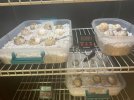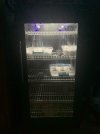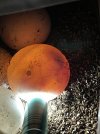Hello-
I have questions I am hoping some keepers that have had similar experiences I have encountered. I currently have a 3.8 group of redfoots that I acquired 2 years ago. The first year with the group, I had many signs of breeding but no eggs or anything. The last year till present breeding has been consistent and daily, and I have received 5-6 clutches from many different females. Every clutch I have artificially incubated. The temperatures I have incubated the eggs are at a consistent 86-87 degrees. Humidity stays also around 80-90%. Eggs are kept in incubation for a max of 160 days and still no results. I have also candled after a couple of weeks and see no chalking or any signs an embryo is evident. I will say I have pulled a recent clutch on 12/19/21 and looks like I possibly see some chalking in some eggs. Also, I use hatch rite for the medium for incubation. I know many breeders that use this and also vermiculite. My question is why are there so many infertile eggs? Could it be the diet? Could it be the hatching medium? Could it be some of my males are shooting blanks? ( this one personally I don't believe is the issue). I would love to hear feedback on this or help in any way possible. I would love to pick a breeder's brain with any experience they've had with this or know what the issue might be.
-Joby


P.S- I have attached photos of my incubator and current eggs.
P.P.S- It has been a long time since I have posted in here and its good to be back!
I have questions I am hoping some keepers that have had similar experiences I have encountered. I currently have a 3.8 group of redfoots that I acquired 2 years ago. The first year with the group, I had many signs of breeding but no eggs or anything. The last year till present breeding has been consistent and daily, and I have received 5-6 clutches from many different females. Every clutch I have artificially incubated. The temperatures I have incubated the eggs are at a consistent 86-87 degrees. Humidity stays also around 80-90%. Eggs are kept in incubation for a max of 160 days and still no results. I have also candled after a couple of weeks and see no chalking or any signs an embryo is evident. I will say I have pulled a recent clutch on 12/19/21 and looks like I possibly see some chalking in some eggs. Also, I use hatch rite for the medium for incubation. I know many breeders that use this and also vermiculite. My question is why are there so many infertile eggs? Could it be the diet? Could it be the hatching medium? Could it be some of my males are shooting blanks? ( this one personally I don't believe is the issue). I would love to hear feedback on this or help in any way possible. I would love to pick a breeder's brain with any experience they've had with this or know what the issue might be.
-Joby


P.S- I have attached photos of my incubator and current eggs.
P.P.S- It has been a long time since I have posted in here and its good to be back!
